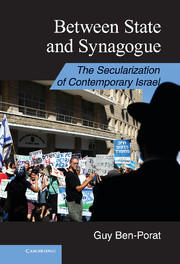1 - Unpacking Secularization
Published online by Cambridge University Press: 05 January 2013
Summary
Almost half a century ago, the theologian Harvey Cox made the important distinction between secularization and secularism:
Secularization implies a historical process, almost certainly irreversible…[whereas] secularism…is the name for an ideology, a new closed world-view which functions very much like a new religion. (Cox, 1965: 20)
The irreversibility of secularization envisioned by Cox, and other scholars of that period, was somewhat premature, as religious persistence and vitality proved in the following decades. However, theorizing secularization in terms of a secularizing social process rather than in terms of an ideology of secular liberalism (Cady, 2005) provides for a better understanding of the multidimensionality and the inherent contradictions of the process. Most important, it may enable one to comprehend how seemingly religious societies can be secularizing or how religion remains significant in seemingly secularizing societies. As discussed in the following chapters, Israel provides a fascinating example of secularization in a state in which religion maintains a significant formal role over public and private life and a society in which secularism (measured in a liberal worldview and commitment) remains rather weak. Some of the developments in Israel, however, have parallels elsewhere, if at different paces and intensities. This chapter sets the theoretical framework for the rest of the book by unpacking the concept of secularization, the forces and motivations behind it, and the way it unfolds.
- Type
- Chapter
- Information
- Between State and SynagogueThe Secularization of Contemporary Israel, pp. 1 - 26Publisher: Cambridge University PressPrint publication year: 2013

